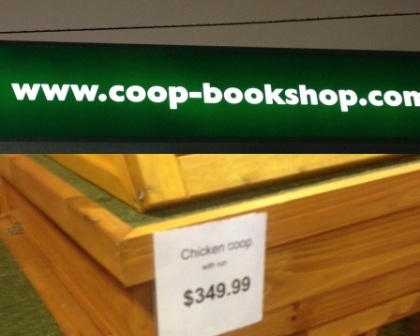Food coops and chicken coops
0 Replies
When I was of an age to watch Sesame St, the buzz word for children was "cooperation" (nowadays it seems to be "resilience").
It always puzzled me why this word had "oo" that didn't sound the usual way, as in "boot" or "book", and then later I wondered why it had no hyphen on TV the way I'd seen it sometimes on paper.
Years later when I joined a bread-making co-op (super-healthy wholegrain loaves, hard as rocks, delivered by bicycle. Such hippies) I would insist on segmenting "co-op" with a hyphen, not "coop". A coop was always a place to keep chickens, in my book.
The food co-op where I refill my shampoo and detergent bottles (yup, still a bit of a hippie) still has a hypen, but hyphens are dropping out of this and other words fast elsewhere, giving us potential segment-ups like reelect, prearrange and microorganism.
However, hyphens are still essential for segmenting many other words – you can't really write "co-own" or "anti-inflammatory" or "re-sorting" without one. I would like to add a something to segment the syllables in "skiing" and "Shiite", but I'm not sure what. And if I'm working with you, please don't call me your "coworker", I grew up on a dairy farm.
One sound or two?
Once you start looking for them, there are heaps of words that look like they contain a familiar vowel spelling representing a single sound, but in fact you need to segment them into separate syllables, as they are working independently to represent separate sounds.
Consider "antidote" and "antipodes", "comely" and "comedy", "boing" and "going", "polecat" and "polemic", "bean" and "pean" (the links take you to wordlists with more examples).
We can't just go sticking hyphens in words like stoic, mosaic, caveat or zoology (am I the only one who thinks it should be "zooology"? Maybe that's just my accent) but segmenting them can be tricky for beginners.
Perhaps we could use the diaeresis, like the words "naïve" and "Noël", the Brontës and aspirational Chloës and Zoës. Chicken coop but food coöp. Looks a bit weird though, not very English.
Pre-segmented or not, these patterns should be learnt
Whether we retain hyphens and/or use diaereses or not (the New Yorker does the latter), learners need to be taught that sometimes, even though letters seem to be working together to represent a single sound, they're not.
My Filipino friend Neri enjoys pointing this out each Christmas by admiring the "shefferds". Not sure what the New Yorker style manual says about this particular "ph", or the "th" in "hothead" and "rathole" and the "sh" in "dishonest" and "ramshorns". Should we segment them more clearly? Did we do so previously, but then slacked off?
A comprehensive spelling curriculum needs to identify and practice less common patterns like these, once the major patterns are established.
Too often, only the main patterns are taught, and learners are left wondering about and tripping over the rest.



Leave a Reply